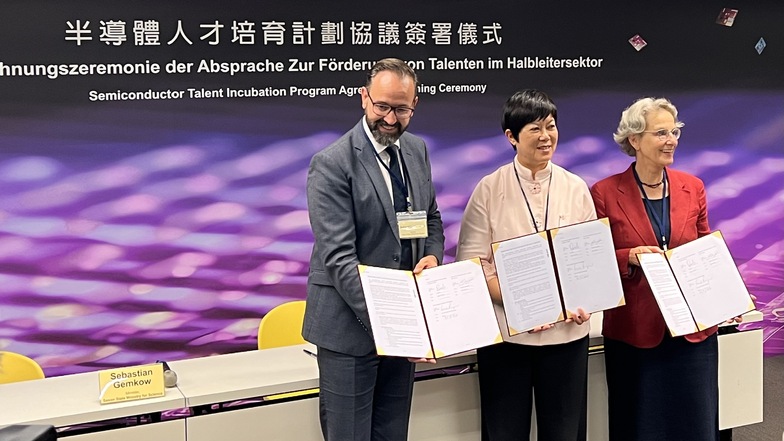By Dorothea Zeppezauer, Taipei
For less than 48 hours, Saxony's Minister of Science Sebastian Gemkow (CDU) and the rector of the Dresden University of Technology (TU)Ursula Staudinger, came to inaugurate the new scientific coordination office in the heart of Taipei. The fact that the delegation from Germany was delayed two hours by a flight delay did not detract from the solemnity of the opening ceremony. Housed in the rooms of the German Chamber of Commerce (AHK), in one of the modern high-rise buildings overlooking the city, the threads of a new cooperation between the two countries are to be brought together from here.
Under the leadership of the TU Dresden and financed by the Free State of Saxony, the liaison office will administer the scientific exchange with Taiwanese partner institutions for all Saxon universities. For a year now, Minister Gemkow has been in active exchange with potential partners, universities and educational institutions in Taiwan.
Under the direction of sinologist Josef Goldberger, who himself has taught at various Chinese and Taiwanese universities and since 2017 has worked for the German Academic Exchange Service (DAAD) was active in Taiwan, the liaison office will coordinate the training of specialists. A first important goal will be to live up to the high expectations that the world's largest chip manufacturer, Taiwan, has of its employees. TSMC in its justification for the choice of location in Dresden. The company is looking forward - it says there - to utilizing the talent and bringing the region's innovation potential to life with its own cutting-edge technology.
To meet this demand and not only create a climate of innovation, but also provide the highly qualified specialists needed, Gemkow has set himself the task of initiating a program with the TU Dresden that will enable forty students in a first round and later up to 100 to complete a six-month exchange study program in Taiwan, consisting of an academic part, which will be taken over by the renowned National Taiwan University (NTU), and a practical part, which will take place at TSMC's training and manufacturing sites. An annual budget of 500,000 euros has been set aside for funding. The first group is scheduled to arrive in Taiwan in spring 2024. Interest among students is high, according to an initial survey.

The exchange program is necessary above all because the corresponding electrical engineering courses in Taiwan are already geared to the specific needs of semiconductor technology. Such a specialization does not exist in the study programs of the TU Dresden and other regional universities. One of the tasks of the liaison office is to administer this study exchange. At the same time, it is to serve as a contact point for interested parties from the target country and assist in the organization of further scientific exchange programs. In this function, it also serves as a pilot project for other liaison offices in countries with which the Free State wants to intensify scientific exchange, be it in India, Vietnam or Chile.
"It fills him with joy and excitement to fill this project, which was planned under time pressure, with life," said Gemkow at the opening and Professor Staudinger added that this first office of Saxony in a partner country marks the beginning of a close and multifaceted cooperation. The future cooperation will be sealed by a trilateral cooperation agreement , which the Minister signed in the afternoon for the Free State of Saxony with Lora Ho, Chief Human Resources Officer of TSMC and Ursula Staudinger at TSMC's Taichung site.

The "Semiconductor Talent Incubation Program" is unique in its tailor-made design, Gemkow emphasized. He was extremely confident that it would be a great success. The TU Dresden rector also emphasized the program's potential to attract new prospective students to science and engineering programs. An education at TSMC has great appeal, she said. The TU Dresden plays a pioneering role in the expansion of scientific exchange between Saxony and Taiwan. And for Ms. Ho from TSMC, the program is "a promising way" to be able to start production at the Dresden site on the planned scale in 2027.
A rarely granted tour of the FAB 15A training center shows what matters to the world market leader. The Newcomer Training Center specializes entirely in training young skilled workers. On twelve floors in modern laboratories, the individual work steps are vividly taught. For this purpose, TSMC not only uses original machines costing millions of dollars, but also machines specially made for the training with transparent back walls that illustrate the processes.
A special focus is on plasma physics, which plays a decisive role in the production of chips. The company is particularly proud of the high practical content, which enables graduates to enter the sensitive production process directly afterwards. And this will also be the case in Dresden in the future.








